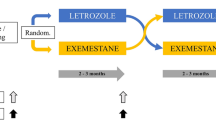Abstract
Aim: To compare the effects of tamoxifen and megestrol acetate on liver proteins, androgens, and glucocorticoids during adjuvant treatment for postmenopausal breast cancer.
Methods: A subgroup of women within a large prospective multicenter trial were followed with blood sampling every 3 mo during 2 yr. Women were randomized to receive either continuous tamoxifen 40 mg/d or repeated sequential treatment with tamoxifen and megestrol acetate (MA) 160 mg/d.
Results: We found profound and distinct differences between the two regimens. Tamoxifen increased steroid-binding proteins (SHBG and CBG) and suppressed circulating androgens and IGF-I. In contrast, the metabolic effects of tamoxifen were clearly antagonized by MA. There was a rise in IGF-I and marked suppression of steroid-binding proteins. Levels of free testosterone were reduced by 70%. MA also caused apparent adrenal suppression.
Conclusion: The different effects on anabolic/catabolic balance and adrenal function may relate to certain clinical effects during treatment.
Similar content being viewed by others
References
Lönning E, Lien EA. Mechanisms of action of endocrine treatment in breast cancer. Crit Rev Oncol Hematol 1995; 21: 158–193.
Early Breast Cancer Trialists’ Collaborative Group. Tamoxifen for early breast cancer: an overview of the randomised trials. Lancet 1998; 351: 1451–1467.
Sedlacek SM. An overview of megestrol acetate for the treatment of advanced breast cancer. Semin Oncol 1988; 15: 3–13.
Parker LM. Sequencing of hormonal therapy in postmenopausal women with metastatic breast cancer. Clin Ther 2002; 24: 43–57.
Gundersen S, et al. Cyclical use of tamoxifen and high-dose medroxyprogesterone acetate in advanced estrogen receptor positive breast cancer. Breast Cancer Res Treat 1990; 17: 45–50.
Brody S, Carlström K, Lagrelius A, Lunell NO, Rosenborg L. Serum levels of 4-androstene-3,17-dione in menstruating and postmenopausal women. Evaluation of a radioimmunoassay and correlation with bone mineral content and endometrial pathology. Acta Obstet Gynecol Scand 1983; 62: 531–534.
Stege R, Eriksson A, Henriksson P, Carlström K. Orchidectomy or estrogen treatment in prostatic cancer: effects on serum levels of adrenal androgens and related steroids. Int J Androl 1987; 10: 581–587.
Södergärd R, Bäckström T, Shanbhag V, Carstensen H. Calculation of free and bound fractions of testosterone and estradiol-17beta to human plasma proteins at body temperature. J Steroid Biochem 1982; 16: 801–810.
Adam HK, Pattersson JS, Kemp JV. Studies on the metabolism and pharmacokinetics of tamoxifen in normal volunteers. Cancer Treat Rep 1980; 64: 761–764.
Pugeat M, et al. Changes in plasma binding protein of sex steroids and transcortin during the treatment of menopause with oral estrogens. Presse Med 1988; 17: 1189–1192.
Odlind V, Milsom I, Persson I, Victor A. Can changes in sex hormone binding globulin predict the risk of venous thromboembolism with combined oral contraceptive pills? Acta Obstet Gynecol Scand 2002; 81: 482–490.
Fisher B, et al. Tamoxifen for prevention of breast cancer: report of the National Surgical Adjuvant Breast and Bowel Project P-1 Study. J Natl Cancer Inst 1998; 90: 1371–1388.
Kuhl H. Effects of progestogens on haemostasis. Maturitas 1996; 24: 1–19.
Hankinson SE, et al. Circulating concentrations of insulin-like growth factor-I and risk of breast cancer. Lancet 1998; 351: 1393–1396.
Campagnoli C, Biglia N, Cantamessa C, Di Sario MM, Lesca L. Effect of progestins on IGF-I serum level in estrogen-treated postmenopausal women. Zentralbl Gynakol 1997; 119: 7–11.
Alexieva-Figusch J, et al. Treatment of metastatic breast cancer patients with different dosages of megestrol acetate; dose relations, metabolic and endocrine effects. Eur J Cancer Clin Oncol 1984; 20: 33–40.
Helle SI, et al. Effects of treatment with megestrol acetate on the insulin-like growth factor system: time and dose dependency. Eur J Cancer 1999; 35: 1070–1075.
Crilly RG, Francis RM, Nordin BE. Steroid hormones, ageing and bone. J Clin Endocrinol Metab 1981; 10: 115–139.
Kostoglou-Athanassiou I, et al. Sex hormones in postmenopausal women with breast cancer on tamoxifen. Horm Res 1997; 47: 116–120.
Carlström K, Karlsson R, Von Schoultz B. Diurnal rhythm and effects of oral contraceptives on serum dehydroepiandrosterone sulfate (DHEAS) are related to alterations in serum albumin rather than to changes in adrenocortical steroid secretion. Scand J Clin Lab Invest 2002; 62: 361–368.
Ortmann J, et al. Testosterone and 5 alpha-dihydrotestosterone inhibit in vitro growth of human breast cancer cell lines. Gynecol Endocrinol 2002; 16: 113–120.
Maggiolini M, Donze O, Jeannin E, Ando S, Picard D. Adrenal androgens stimulate the proliferation of breast cancer cells as direct activators of estrogen receptor alpha. Cancer Res 1999; 59: 4864–4869.
Lipworth L, Adami HO, Trichopoulos D, Carlstrom K, Mantzoros C. Serum steroid hormone levels, sex hormone-binding globulin, and body mass index in the etiology of postmenopausal breast cancer. Epidemiology 1996; 7: 96–100.
Lundgren S, Helle SI, Lönning PE. Profound suppression of plasma estrogens by megestrol acetate in postmenopausal breast cancer patients. Clin Cancer Res 1996; 2: 1515–1521.
Subramanian S, Goker H, Kanji A, Sweeney H. Clinical adrenal insufficiency in patients receiving megestrol therapy. Arch Intern Med 1997; 157: 1008–1111.
Naing KK, Dewar JA, Leese GP. Megestrol acetate therapy and secondary adrenal suppression. Cancer 1999; 86: 1044–1049.
Holly J. Insulin-like growth factor-I and new opportunities for cancer prevention. Lancet 1998; 351: 1373–1375.
Labrie F. Mechanism of action and pure antiandrogenic properties of flutamide. Cancer 1993; 72: 3816–3827.
Vadell C, et al. Anticachectic efficacy of megestrol acetate at different doses and versus placebo in patients with neoplastic cachexia. Am J Clin Oncol 1998; 21: 347–351.
Karcic E, Philpot C, Morley JE. Treating malnutrition with megestrol acetate: literature review and review of our experience. J Nutr Health Aging 2002; 6: 191–200.
Goss PE, et al. A randomized trial of letrozole in postmenopausal women after five years of tamoxifen therapy for early-stage breast cancer. N Engl J Med 2003; 349: 1739–1802.
Author information
Authors and Affiliations
Corresponding author
Rights and permissions
About this article
Cite this article
Löfgren, L., Wallberg, B., Wilking, N. et al. Tamoxifen and megestrol acetate for postmenopausal breast cancer. Med Oncol 21, 309–318 (2004). https://doi.org/10.1385/MO:21:4:309
Received:
Accepted:
Issue Date:
DOI: https://doi.org/10.1385/MO:21:4:309




